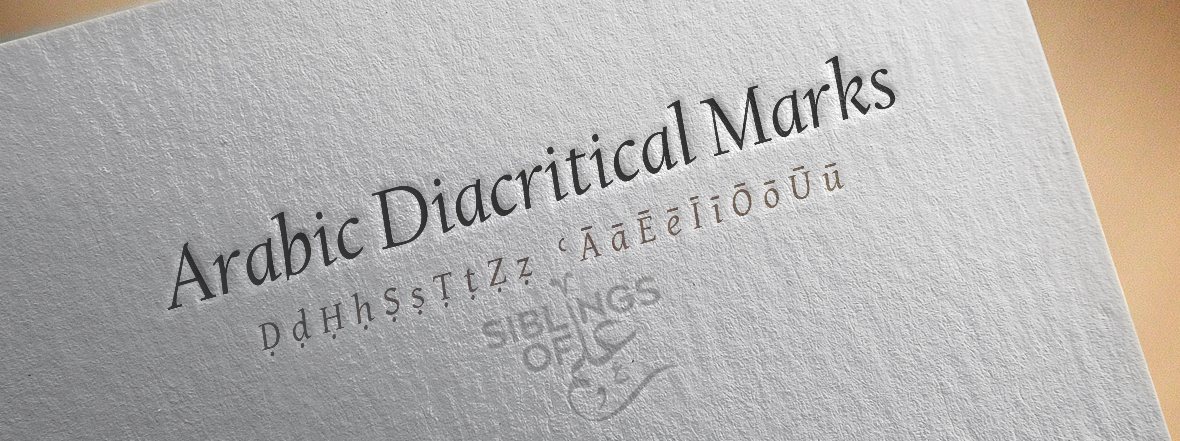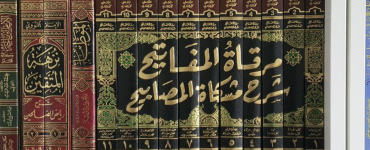بسم الله الرحمن الرحيم
OVERVIEW
When reading the collections of ḥadīth, seeing names like ʿAbdullāh ibn ʿAbd ar-Raḥmān, Sālim ibn ʿAbdillāh, and Saʿīd ibn al-Musayyib in the chains of transmission are what one would regard as the traditional and typical names of narrators. However, sometimes one encounters anomalous names such as “Ghundar” and “Ābi ‘l-Laḥm” and considering their meanings wonder, what a strange name? One may feel perplexed as to whether it is a paidonymic (kunyah), a nickname (laqab), or a name of attribution (nisbah). In this article, I have selected some of the most common and interesting titles/nicknames (alqāb) of narrators from a few books and briefly explained what they translate to, where they originate from, and what was the reason why narrators were given them. I have listed all nicknames in alphabetical order (Arabic).
[ ألف ]
Ābi ‘l-Laḥm: Ābi ‘l-Laḥm (The meat rejector) was the nickname given to a Companion from the Ghifārī tribe. It was said that his name was Khalaf and he was martyred during the battle of Ḥunayn. He was given this nickname because he would reject meat that would be slaughtered for idols (during the period of ignorance).
Abu ‘l-Ādhān: This is the nickname of Ḥāfiẓ ʿUmar ibn Ibrāhīm. Abū Bakr was his teknonym. Imām Ibn aṣ-Ṣalāḥ (raḥimahullāh) mentions that he was titled Abū al-Ādhān (lit. the father of ears) because he had big ears.
Abū Turāb: This is the nickname of the Companion ʿAlī ibn Abī Ṭālib (raḍī Allāhu ʿanh). He was given this title after the Messenger of Allāh (ṣal Allāhu ʿalayhī wa-sallam) found him sleeping on the ground and his clothes were covered with soil, hence the nickname: “The Father of Soil.”
Abu ‘r-Rijāl: This is the nickname of Muḥammad ibn ʿAbd ar- Raḥmān al-Anṣārī (d. 148 AH). He was the son of ʿAmrah bint ʿAbd al-Raḥmān (raḥimahallāh) and became famous with this nickname because he had ten children who were all males, thus his title is literally “The Father of Men.”
Al-Aʿraj: Al-Aʿraj (crippled) was the nickname of ʿAbd al-Raḥmān ibn Hurmuz, Abū Dāwūd al-Madanī (d. 117 AH), the mawlā of Rabīʿah ibn al-Ḥārith. He was a reliable narrator of ḥadīth and very knowledgeable.
Al-Aʿmash: Al-Aʿmash (bleary-eyed) was the nickname of Sulaymān ibn Mihrān al-Asadī, Abū Muḥammad al-Kūfī (d. 147-8). He was knowledgeable regarding qirāʾah, abstinent, trustworthy, and a ḥāfiẓ of ḥadīth.
Al-Akhfash: Al-Akhfash (dim-eyed) was the nickname of several people, including the grammarian Aḥmad ibn ʿImrān al-Baṣrī. An early scholar of ḥadīth, he transmitted from Zayd ibn al-Ḥubāb and others. He has a book entitled Gharīb al-Muwaṭṭaʾ (lit. Rare Words in Mālik’s Muwaṭṭaʾ).
There are three famous Akhfashes who were grammarians. The first was Abu ‘l-Khaṭṭāb ʿAbd al-Ḥamīd ibn ʿAbd al-Majīd and he was the one Sībawayhi (d. 180/796) mentioned in his Kitāb. This first Akhfash was known as al-Akhfash al-Akbar Qifṭī and little is known about him.
The second was Abu ‘I-Ḥasan Saʿīd ibn Masʿadah (d. 215/830) and he is the one who related Kitāb Sībawayh (The Book of Sībawayh) and was a student of Sībawayh. He was known as al-Akhfash al-Awsaṭ and he wrote works on the vocabulary of the ḥadīth and Qurʾān.
The third is Abu ‘l-Ḥasan ʿAlī ibn Sulayman (d. 315/927), the student of the two grammarians bearing the paidonymic “Abu ‘l-ʿAbbās,” namely Aḥmad ibn Yaḥyā (d. 291/904), nicknamed “Thalab,” and Muhammad ibn Yazīd (d. 285/898) nicknamed “al-Mubarrad.” He was known as al-Akhfash al-Aṣghar and he was an expert in grammar and lexicography.
[ ب ]
Barīr: This has been mentioned as the nickname of the Companion Abū Dhar Jundub ibn Junādā al-Ghifārī (d. 31-2 AH) (raḍī Allāhu ʿanh). Some say his name was not Jundub, rather it was Barīr (mukabbar) or Burayr (muṣaghghar), and his father’s name was Jundub, ʿAshraqah, ʿAbdullāh, or al-Sakan.
Bundār: Bundār (Persian: wholesaler) was the nickname of Muḥammad ibn Bashshār al-Baṣrī (d. 252/866). Ibn al-Falakī said that he was given this title because he was the “wholesaler” of ḥadīth. Imām Bukhārī, Imām Muslim, and many others transmitted ḥadīth from him.
[ ج ]
Jalājlī: This was the nickname of Mūsa ibn Ḥasan. He was given this nickname due to his loud, bell-like voice.
Jazarah: This was the nickname of Ṣālih ibn Muhammad al-Baghdādī (d. 293/906). He was nicknamed this because he heard from one of his teachers what was related from ʿAbdullāh ibn Busr to the effect that he used to employ a kharazah/خَرَزَة (bead) for ruqyah, but he because he misread it, saying jazarah/جَزَرَة (carrot), it stuck to him and became his nickname.
[ ح ]
Ḥamdān: This title has been related for the following people:
- Muḥammad ibn Saʿīd Isbahāni Abū Jaʿfar. He was from amongst the teachers of Imām Bukhārī (raḥimahullāh).
- Aḥmad ibn ʿAmr also had this title and was also known as Ḥamdān ibn ʿAmr al-Baghdādī. Imam Bukhārī (raḥimahullāh) has narrated only one ḥadīth from him under the commentary of Sūrah Māʾidah.
- Aḥmad ibn Yūsuf al-Naisāpūrī.
As will be explained under the nickname ʿAbdān, one reason why narrators may be been given this nickname is that both the narrator’s name and paidonymic are derivatives of the same noun such as, for example, his name is Aḥmad and paidonymic is Abū Muḥammad. Here also, it is possible that they received the nickname Ḥamdān because all of their first names are derivatives of the noun Ḥamd and although I have not mentioned their paidonymics, it is possible that they too were derivatives of the noun Ḥamd.
Al-Ḥadhdhāʾ: Al-Ḥadhdhāʾ (shoemaker) was the nickname of Khālid ibn Mihrān Abu ‘l-Manāzil (d. 142 AH). It has been said that he was nicknamed this because he would sit by the shoemakers.
[ خ ]
Khaqān:
This title has been related for the following people:
- Yaḥyā ibn ʿAbdillāh Abū Sahl, and
- Abū Layth al-Sulamī al-Balkhī.
I did not come across the meaning of Khaqān in any of the sources I consulted but Khaqān or “Khagān” or “Qāghan” is a title of imperial rank in the Turkic, Mongolic, and some other languages, equal to the status of an emperor and someone who rules a khaganate. It may be translated as “Khan of Khans”, equivalent to King of Kings. Imām Bukhāri (raḥimahullāh) narrated from them under the commentary of Sūrah Anfāl and Kitāb al-Aṭʿimah.
[ ذ ]
Dhu ‘l-Udhunayn: Dhu ‘l-Udhunayn (the one with two ears) was the nickname of the Companion Anas ibn Mālik al-Anṣārī (d. 93 AH) (raḍī Allāhu ʿanh), the servant of the Messenger of Allāh for ten years. The Messenger of Allāh (ṣal Allāhu ʿalayhī wa-sallam) would playfully call him by this nickname.
Dhu ‘l-Janāhayn: Dhu ‘l-Udhunayn (the one with two wings) was the nickname of the Companion Jaʿfar ibn Abī Ṭālib al-Hāshimī (d. 8 AH) (raḍī Allāhu ʿanh). He was the son of Abū Ṭālib and the cousin of the Messenger of Allāh (ṣal Allāhu ʿalayhī wa-sallam). He was martyred in the battle of Muʾtah.
Dhu ‘sh-Shahādatayn: Dhu ‘sh-Shahādatayn (the possessor of two testimonies) was the nickname of the Companion Khuzaymah ibn Thābit al-Anṣārī (d. 37 AH) (raḍī Allāhu ʿanh). He was given this nickname when he testified for the Messenger of Allāh (ṣal Allāhu ʿalayhī wa-sallam) regarding a transaction that he made with a bedouin, even though Khuzaymah (raḍī Allāhu ʿanh) did not witness it. He testified because he knew that the Messenger of Allāh (ṣal Allāhu ʿalayhī wa-sallam) does not lie, hence his testimony is regarded as two.
Dhu ‘n-Nūrayn: Dhu ‘n-Nūrayn (the possessor of two lights) was the nickname of the Companion ʿUthmān ibn ʿAffān (d. 35 AH) (raḍī Allāhu ʿanh). He was given this nickname because he married two of the daughters of the Messenger of Allāh (ṣal Allāhu ʿalayhī wa-sallam). He was martyred after reigning for twelve years in Dhu ‘l-Ḥijjah after ʿĪd al-Aḍḥā.
[ س ]
Safīnah: This was the nickname of Mihrān Abū ʿAbd ar-Raḥmān. He was from amongst the freed slaves of the Messenger of Allāh (ṣal Allāhu ʿalayhī wa-sallam). On one occasion whilst he was on a journey with the Messenger of Allāh (ṣal Allāhu ʿalayhī wa-sallam), people felt tired so he helped them by carrying their swords and other luggage. Seeing this, the Messenger of Allāh (ṣal Allāhu ʿalayhī wa-sallam) said to him, “You are a safīnah (lit. a ship).”
Samīn: Samīn (corpulent) was the nickname of Muḥammad ibn Ḥātim Abū ʿAbdillāh.
Sunayd: This was the nickname of al-Ḥusayn ibn Dāwūd al-Miṣṣīṣī (d. 226/841), the author of the Qurʾān commentary. The experts Abū Zurʿah [al-Rāzī] and Abū Ḥātim [al-Rāzī] and others related ḥadīth from him.
Sajjādah: The famous Sajjādah (prayer rug) was the nickname of al-Ḥasan ibn Ḥammād (d. 241/855). He heard ḥadīth from Imām Wakīʿ and others.
[ ص ]
Ṣāʿiqah: Ṣāʿiqah (thunderbolt) was the expert Abū Yaḥyā Muḥammad ibn ʿAbd ar-Raḥīm. Abū ʿAlī Naysāpūrī said that he was nicknamed “Ṣāʿiqah” because of his learning and the intensity of his study and pursuit [of ḥadīth]. Imām Bukhārī and others transmitted ḥadīth from him.
[ ض ]
Al-Ḍāll: Al-Ḍāll (the misguided) was the title of Muʿāwiyah ibn ʿAbd al-Karīm. He was given this title because he went astray only on the road to Makkah, and not because he was misguided in his religion. He had a companion who was also named Muʿāwiyah, and whenever he would be called, his companion would answer. To avoid confusion, they would call him: Muʿāwiyah al-Ḍāll.
Al-Ḍaʿīf: Al-Ḍaʿīf (the weak) was the title of Abū Muḥammad ʿAbdullāh ibn Muḥammad al-Ṭarsūsī. He heard ḥadīth from Abū Muʿāwiyah and others. Abū Ḥātim al-Rāzī wrote ḥadīth from him and Abū Ḥātim ibn Ḥibbān claimed that he was antiphrasistically called Al-Ḍaʿīf on account of his exactitude and accuracy.
[ ط ]
Ṭāwūs: Zakwān ibn Abī Ḥanīfah (although some scholars say his name was, in fact, Tāwūs). Imām Yaḥyā ibn Maʿīn says: “He was given the title Tāwūs because he was the best-looking of the qurrāʾ (like the beauty of a peacock).”
Al-Ṭayyib: Al-Ṭayyib (the pure, good) was the nickname of Murrah ibn Shuraḥbīl. Imām Yaḥyā ibn Maʿīn says: “He was known as Murrah al-Ṭayyib due to his excessive worship.”
[ ع ]
ʿĀrim: This is the title of Abū an-Nuʿmān Muḥammad ibn al-Faḍl as-Sadūsī. He was a pious man far from ʿarāmah (mischief) even though his title literally means ‘vicious’.
ʿAbdān: This is the nickname of several transmitters, the earliest of whom was ʿAbdullāh ibn ʿUthmān al-Marwazī, the student and main transmitter of Ibn al-Mubārak. Imām Ibn Ṭāhir al-Maqdisī said that he was called ʿAbdān because his paidonymic was Abū ʿAbd al-Raḥmān and his name was ʿAbdullāh so the two “ʿAbds” come together. Imām Ibn aṣ-Ṣalāḥ said that this reason is incorrect rather it is because people would shorten the names of youngsters and say “ʿAllān” instead of ʿAlī and “Ḥamdān” instead of Aḥmad and “Wahbān” instead of Wahb.
[ غ ]
Ghundar: Ghundar (troublemaker) was the nickname of Abū Bakr Muḥammad ibn Jaʿfar al-Baṣrī. The reason for it was that Ibn Jurayj came to Baṣra and transmitted the ḥadīth of Ḥasan al-Baṣrī to the Basrans. They censured him for that and stirred up trouble. Muḥammad ibn Jaʿfar agitated a lot and Ibn Jurayj said to him, “Be quiet, Ghundar!” The Hejazians term someone who incites discord ghundar.
There were other “Ghundars” after him, each of whom bore it as a nickname, including Abū ‘I-Ḥusayn Muḥammad ibn Jaʿfar al-Rāzī, Ghundar: he transmitted ḥadīth from the expert Abū Ḥātim al-Rāzī and others.
Abū Bakr Muḥammad ibn Jaʿfar al-Baghdādī, Ghundar, ” the widely traveled expert: the expert Abū Nuʿaym [al-Iṣbahānī] and others transmitted ḥadīth from him.
Abū ‘I-Ṭayyib Muḥammad ibn Jaʿfar ibn Durrān al-Baghdādī, Ghundar: he transmitted ḥadīth from Abū Khalīfah al-Jumaḥī and others.
There were others who bore that nickname who were not named “Muḥammad ibn Jaʿfar.”
Imām Aḥmad ibn Ḥanbal (raḥimahullāh) says that Ghundar said, “I clung to Shuʿbah for 20 years.”
Imām Yaḥyā ibn Maʿīn says, “He (Ghundar) would fast one day and eat another for 50 years.”
Ghunjār: Ghunjār (Persian: ghanjār, rouge) was the nickname of an early transmitter, Abū Aḥmad ʿIsā ibn Mūsā at-Taymī al-Bukhārī. He transmitted ḥadīth from Imām Mālik, ath-Thawrī, and others. He was nicknamed “Ghunjār” because of his rosy cheeks.
[ ق ]
Qibṭī: ʿAbd al-Mālik ibn ʿUmayr al-Lakhmī (raḥimahullāh). He was known by this nickname because he would be attributed to his horse which was strong and outstandingly fast during races.
[ م ]
Al-Mājishūn: This is the nickname of Yaʿqūb ibn Abī Salamah (raḥimahullāh). Ibrāhīm al-Ḥarabī says, “He became known with the title ‘Majishūn’ that is originally a Fārsī word which means rosy/red. He was called this because of his rosy cheeks.” Al-Mājishūn also comes in the meaning of moonlike, perhaps referring to his moonlike face.
Mushkdānah: Its meaning in Persian is “gain of musk” or “musk holder”. This is the nickname of Abū ʿAbd Ar-Raḥmān, ʿAbdullāh ibn ʿUmar. He was asked why he has been given this title to which he replied: “By Allāh! It was Abū Nuʿaym that gave me this title. I would attend his gatherings after dressing and perfuming myself, and when he would see me, he would say, ‘The mushk-dānah is here.’”
[ ن ]
Al-Nabīl: This is the nickname of Abū ʿĀsim Dhaḥḥāq ibn Makhlad ash-Shaybānī (raḥimahullāh). It is mentioned that he has been given the title an-Nabīl (the high-minded) because on one occasion when an elephant was brought to Baṣrah (where it normally is not seen), all the people rushed to see it except him. Ibn Jurayj (raḥimahullāh) asked him, “What is the matter that you do not go to see (i.e. the elephant)?” Abū ʿĀsim replied, “Other than you (i.e. the ḥadīth I learn from you), I have no need for anything.” Hearing this, Ibn Jurayj (raḥimahullāh) said, “You are al-Nabīl.” Others say that he would wear expensive clothing and when Ibn Jurayj (raḥimahullāh) would see him, he would say, “The al-Nabīl (nobleman) has come.”
This is all that Allāh Taʿālā has facilitated for me to write.
Written by The Hadith Disciple
Sources
- Alqāb aṣ-Ṣaḥābah wa at-Tābiʿīn fī al-Musnadayn aṣ-Ṣaḥiḥayn al-Musammā bi al-Alqāb by Abū ʿAlī al-Ḥusayn ibn Muḥammad ibn Aḥmad al-Ghassānī al-Andalusī
- Siyar Aʿlām an-Nubalāʾ by Imām Shams al-Dīn Muḥammad ibn Aḥmad adh-Dhahabī
- Taqrīb at-Tahdhīb by Imām Ibn Ḥajar al-ʿAsqalānī
- Maʿrifat Anwāʿ ʿIlm al-Ḥadīth by Imām Ibn aṣ-Ṣalāḥ






